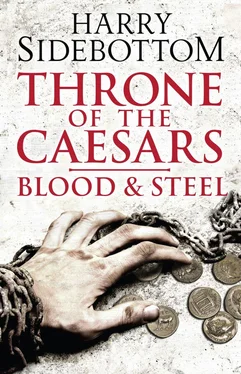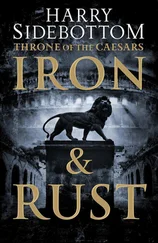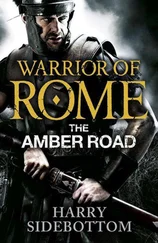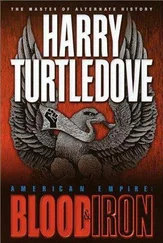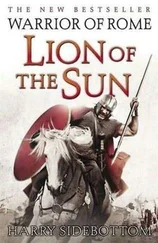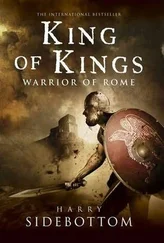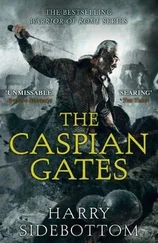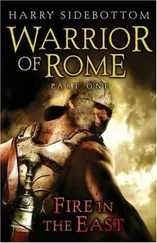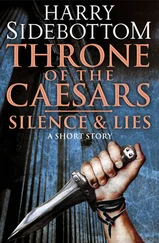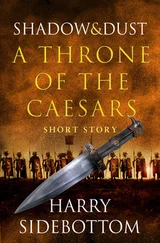Harry Sidebottom - Blood and Steel
Здесь есть возможность читать онлайн «Harry Sidebottom - Blood and Steel» — ознакомительный отрывок электронной книги совершенно бесплатно, а после прочтения отрывка купить полную версию. В некоторых случаях можно слушать аудио, скачать через торрент в формате fb2 и присутствует краткое содержание. Год выпуска: 2015, ISBN: 2015, Издательство: HarperCollins Publishers, Жанр: Исторические приключения, на английском языке. Описание произведения, (предисловие) а так же отзывы посетителей доступны на портале библиотеки ЛибКат.
- Название:Blood and Steel
- Автор:
- Издательство:HarperCollins Publishers
- Жанр:
- Год:2015
- ISBN:9780007499908
- Рейтинг книги:3 / 5. Голосов: 1
-
Избранное:Добавить в избранное
- Отзывы:
-
Ваша оценка:
- 60
- 1
- 2
- 3
- 4
- 5
Blood and Steel: краткое содержание, описание и аннотация
Предлагаем к чтению аннотацию, описание, краткое содержание или предисловие (зависит от того, что написал сам автор книги «Blood and Steel»). Если вы не нашли необходимую информацию о книге — напишите в комментариях, мы постараемся отыскать её.
Blood and Steel — читать онлайн ознакомительный отрывок
Ниже представлен текст книги, разбитый по страницам. Система сохранения места последней прочитанной страницы, позволяет с удобством читать онлайн бесплатно книгу «Blood and Steel», без необходимости каждый раз заново искать на чём Вы остановились. Поставьте закладку, и сможете в любой момент перейти на страницу, на которой закончили чтение.
Интервал:
Закладка:
QUOTES
The speeches in chapters three and eleven are drawn from the third century AD book of advice to orators by Menander Rhetor (edited, with translation and commentary, by D. A. Russell, and N. G. Wilson, Oxford, 1981).
In chapter twenty-four the Odyssey of Homer is recited in the translation of Robert Fagles (2006).
PREVIOUS WRITERS
In all my novels I like to include homages to writers who have given me great pleasure and inspiration.
Manu’s song in chapter twenty-eight is a paederastic version of one sung by Harry Paget Flashman in George MacDonald Fraser’s first outing with the arch cad (1969).
George R.R. Martin is very good at killing characters. The death of one character in Blood amp; Steel contains an echo of the death of … someone, in A Dance with Dragons (2011).
The final chapters are haunted by Cavafy’s poem The God Abandons Antony (and a bit of Plutarch and Shakespeare).
Glossary
The definitions given here are geared to Blood amp; Steel . If a word or phrase has several meanings only that or those relevant to this novel tend to be given.
A Cubiculo : Official in charge of the bedchamber.
A Rationibus : Official in charge of the Emperor’s finances.
Abrenak : Modern Nishapur in northeastern Iran.
Achaea : Roman province of Greece.
Acherusian Peninsula : Place where, in Greek mythology, Hercules is said to have entered the Underworld; Modern Cape Baba on the northeastern coast of Turkey.
Acropolis : Sacred citadel of a Greek city.
Ad Aquas : Resort town on the northeastern coast of Africa Proconsularis ; modern Bordj Sebbalat in Tunisia.
Ad Palmam : Oasis on the margin of the Lake of Triton (Chott el Djerid), southwest of Africa Proconsularis .
Ad Pirum : Roman fort in the Julian Alps; sited on the Hrušica plateau in modern Slovenia.
Aedile : Junior magistrates responsible for the upkeep of public buildings and the organization of festivals; expected to contribute their own money to put on lavish spectacles and games.
Aesontius river : The modern Isonzo river, flowing from the Julian Alps into the Adriatic.
Africa Proconsularis : Roman province of central North Africa, roughly modern Tunisia.
Agora : Greek term for a market place and civic centre.
Ahuramazda (also Mazda ): ‘The Wise Lord’, the supreme god of Zoroastrianism, chief religion of the Sassanid empire.
Ala : Units of Roman auxiliary cavalry, usually around 500-, sometimes around 1000-strong; literally, a ‘wing’.
Alban Hills : Volcanic region 10 miles southeast of Rome, site of the legionary camp of the Second Parthian Legion.
Alcyonae : Poem on the mythical Alcyone written by Gordian the Elder; a short quotation survives.
Alexandrians : Population of the city of Alexandria in Egypt, notorious for their outspoken and riotous behaviour.
Alpha to Omega : The first and last letters of the Greek alphabet.
Alpha, beta, gamma : The first three letters of the Greek alphabet; also used as the symbols for the numbers 1, 2, 3.
Amicitia : Latin, ‘friendship’; the ancient term can be used with politi-cal overtones, suggesting ties of obligation and patronage.
Amicus (plural amici ): Latin, ‘friend’.
Ammaedara : Roman town on the eastern border of Tunisia; modern Haïdra.
Amphora (plural amphorae ): Large Roman earthenware storage vessels.
Andegan : Territory in southern Iran, probably around modern Fars.
Anna Perenna : Roman goddess of the year’s cycle; her festival was celebrated on the Ides of March.
Antaeus : In Greek mythology, a half-giant who forced all he came across to wrestle; having defeated them, he collected their skulls to build a temple to his father Poseidon.
Antediluvian : In Greek mythology, time before the flood of Deucalion, which swept away the first age of men.
Antioch : Ancient city on the Orontes river in northeastern Syria; second city of the eastern Roman empire.
Antoniniad : Epic poem alleged to have been written by Gordian the Elder on the Emperors Antoninus Pius and Marcus Aurelius; only the title survives.
Aornum : Site of ‘Charon’s Cave’ in northwestern Greece, thought to be an entrance to the underworld.
Apollo : Greek god of music and culture.
Apulia : Modern Puglia, the ‘heel’ of Italy.
Aquileia : Town in northeastern Italy.
Arabia : Roman province covering much of modern Jordan and the Sinai peninsular.
Aramaic : Ancient language spoken in much of the Levant and Mesopotamia.
Arch of Drusus : Arch erected in honour of Drusus, son of the Emperor Tiberius, erected in the vicinity of the Forum.
Arch of Titus : Monumental arch between the Roman Forum and Flavian Amphitheatre, commemorating the re-conquest of Jerusalem in AD70.
Archimea : Town in the southeastern foothills of the Julian Alps.
Arcia : Settlement in the southeastern ranges of the Julian Alps.
Ares : Greek god of war.
Arete : Fictional town on the Euphrates, modelled on Dura-Europus.
Ariminum : Modern Rimini on the northeastern coast of Italy.
Armenia : Ancient buffer kingdom between Rome and Parthia, occupying much of the area south of the Caucasus mountains and west of the Caspian Sea; much larger than the modern state of Armenia.
Arsacid : Dynasty that ruled Parthia 247BC-AD228.
Aryans : Literally ‘nobles’; term used by the Parthians to describe themselves as a people.
Asclepius : Greek god of medicine.
Asia : Roman province of western Turkey.
Athenian : Citizen of the Greek city-state of Athens.
Atlas : In Greek mythology, giant who supports the globe.
Atrium : Open court in a Roman house.
Augustus (plural Augusti ): Name of the first Roman emperor, subsequently adopted as one of the titles of the office.
Ausonian : Greek name for the peoples of the Italian peninsular.
Auxiliary : Roman regular soldier serving in a unit other than a legion.
Bacchanalian : From the festival of the god of wine, Bacchus.
Bacchic : Fuelled by wine; from the religious frenzy of the worshippers of the god Bacchus.
Bactria : Ancient region lying north of the Hindu Kush and west of the Himalayas.
Ballistae (singular Ballista ): Roman torsion artillery firing a bolt with great force and accuracy.
Читать дальшеИнтервал:
Закладка:
Похожие книги на «Blood and Steel»
Представляем Вашему вниманию похожие книги на «Blood and Steel» списком для выбора. Мы отобрали схожую по названию и смыслу литературу в надежде предоставить читателям больше вариантов отыскать новые, интересные, ещё непрочитанные произведения.
Обсуждение, отзывы о книге «Blood and Steel» и просто собственные мнения читателей. Оставьте ваши комментарии, напишите, что Вы думаете о произведении, его смысле или главных героях. Укажите что конкретно понравилось, а что нет, и почему Вы так считаете.
